Part One – Candidates Questions – We are just five weeks out from the November Election date. And while all eyes are focused on the Presidential Debate scheduled for Wednesday, locally voters have critical choices and nowhere more than on schools where the public will be asked to decide between five very different candidates for school board and whether to fund another parcel tax, Measure E.
This summer, the Vanguard launched an editorial board. There will be a number of functions for that board, including helping to direct and advise the direction of the Vanguard. The first public event was last night’s candidates forum for the school board candidates, held at at Harper Junior High.
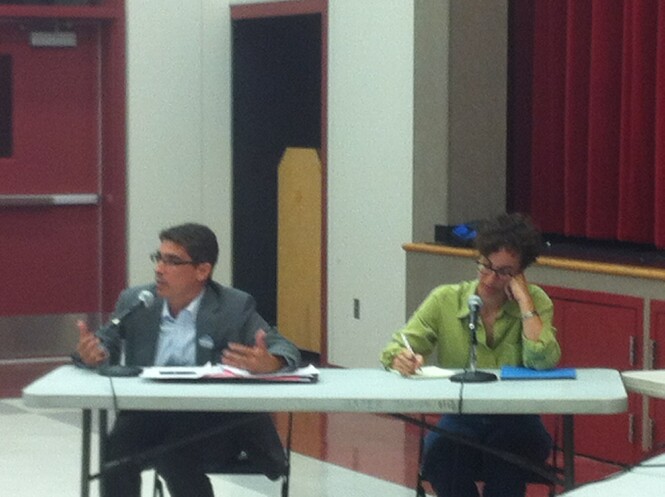 As I joked yesterday, when we first envisioned the candidates forum and planned for October 1, we did not conceive that it would be 100 degrees. Nevertheless, the evening was a pleasant one as the candidates highlighted their qualifications and differences.
As I joked yesterday, when we first envisioned the candidates forum and planned for October 1, we did not conceive that it would be 100 degrees. Nevertheless, the evening was a pleasant one as the candidates highlighted their qualifications and differences.
The forum was moderated by Matt Williams (one of the members of the editorial board, along with Robb Davis, Cecilia Escamilla-Greenwald, Tia Will and myself), and we sought to ask questions that might not normally get asked. The first part of that was the written questions that we published last week in two parts that drew over 100 comments.
Then we had each candidate draft two questions and ask one of their fellow candidates. Finally, we drew on some audience questions, as well.
The result was a unique set of questions and a diverse set of answers. For those who criticize the school board for being too homogeneous, this is your opportunity, because each of the candidates has his or her own unique perspective, and from what we could see, well thought out questions.
The first question, asked by Alan Fernandes, was what policies currently pending in the state government do you believe will have a significant impact for our schools?
For the most part, the candidates addressed Proposition 30 and the impact of the proposition on the finances of Davis School Districts.
Jose Granda talked about a measure that would create a sliding scale for taxation, in which those who earn more pay more.
Nancy Peterson addressed AB 5, which passed the Assembly and is on the floor of the Senate. This is bill “would require the governing board of each school district to adopt and implement a locally negotiated best practices teacher evaluation system.”
As Ms. Peterson noted, this is a huge issue, the basis for Chicago’s teacher strike. She argued that we should not do evaluations strictly on test scores because every student is different.
Susan Lovenburg also noted that Governor Brown is proposing that we change the current system of school funding and create a weighted per-pupil funding system which would throw out the current daily attendance. The argument is that some students are more expensive to educate than others and this would create more funding for district based on needs.
She noted that Davis would receive less funding for schools, since we have fewer at-risk students and that this is not something that we want at the moment.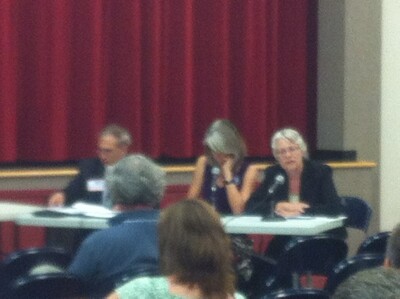
Mr. Fernandes noted that weighted school formula is the one policy that would probably have the biggest impact on Davis.
Claire Sherman drew the next question and asked whether the school board should be evaluated on a yearly basis.
Jose Granda argued that everyone should be evaluated, that it is not a witch hunt but rather a non-partisan, non-political office.
Nancy Peterson was more retrospective, arguing that an evaluation when things are so emotionally charged is difficult. You don’t want board members making choices because they’re popular. While an evaluation is always a good idea, she said that she is afraid it would cause us to be driven by politics and not by what’s best for the children.
Susan Lovenburg responded that the community evaluates the board every four years at the ballot box, that is built into the process. She is, however, in favor of self-evaluation where the board can evaluate its effectiveness as a governing team.
Alan Fernandes largely agreed that, while evaluation is healthy, that’s what an election is for, ultimately.
Ms. Sherman clarified her question, saying that when she talks about an evaluation, she means the board should check in with the public. The people at meetings are there not to evaluate the board but for issues of importance. She wants to make sure the school board really checks in with all the schools and the parents so that it’s not the community coming to the board, but the board coming to the community.
Jose Granda asked since the board deals with educational issues and therefore requires expertise, have you spent time teaching yourself? What is good teaching and what is bad teaching?
All of the board candidates had some experience teaching, whether in the classroom or in professional situations.
Susan Lovenburg made the additional point that the board’s role is not professional education for the district. The district already has professional educators who craft the policy. She said, they are the experts. The board is the conduit for community input in our schools.
Alan Fernandes added that he would never make his own experience the dictator of what policies should exist at the school, going forward. He noted that there are marked differences in how children learn and technology has enhanced some of those differences.
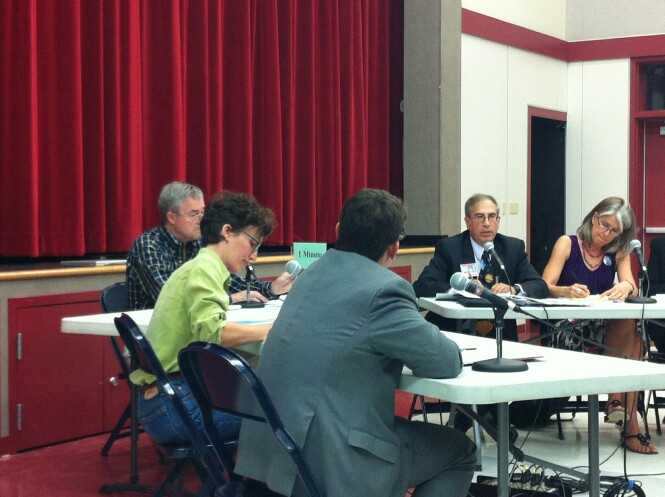 Claire Sherman drew a difference with Ms. Lovenburg, as she argued that teachers are doing a lot more with a lot less and therefore she believes its important to have someone on the board who has some empathy and experience who can relate to what a teacher is going through.
Claire Sherman drew a difference with Ms. Lovenburg, as she argued that teachers are doing a lot more with a lot less and therefore she believes its important to have someone on the board who has some empathy and experience who can relate to what a teacher is going through.
Jose Granda concluded this round, arguing that in order to be in this position, you need to have the experience of being in the classroom. Problem with current board: “I don’t see the hands-on experience. I want to give the board a completely different direction.” He added, “I’m the only one currently in the classroom.”
Nancy Peterson asked what might be of unique concern for a school with a significant Title 1 population?
Susan Lovenburg said that Title 1 funding has been a significant component of program improvement, that funding levels have been shifting between schools, but this funding is intended to help those students that are considered most at risk.
Alan Fernandes noted that his experience has to do with policies at the state levels and looking at the impact of state issues on local government.
Claire Sherman noted that during her time of volunteering she worked with children of migrant farm workers, who, even though they get extra support in terms of money, need more individual attention which is not occurring with class sizes at 30.
Jose Granda said that he is the product of the American Dream, coming to this country in high school not speaking any English, but able to go to Berkeley and Davis. He said that schools have to be able to understand the culture of people with low socioeconomic backgrounds. The objective is for English speaking kids to become bilingual. He said that, given his background, he is sensitive to the Spanish-speaking kids attempting to learn English. And he argued that, since he knows that culture and the need to fulfill the American Dream, it gives him the skills necessary to help other students.
Nancy Peterson noted that even though a student may be from a low socioeconomic family, they may not qualify for services and she emphasized the need to remember that many of the low socio-economic kids are coming to school hungry.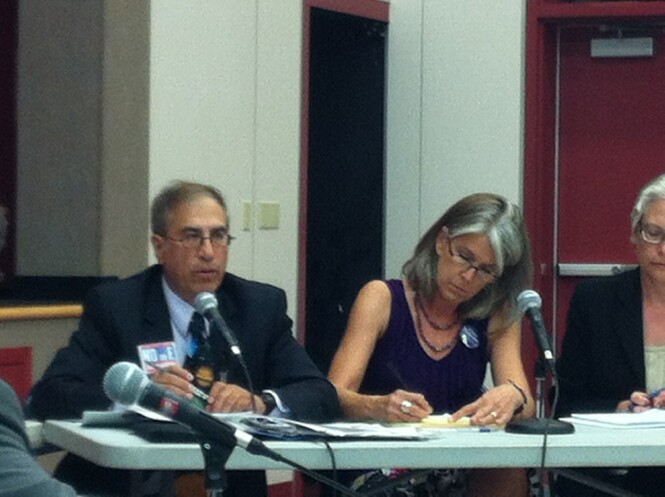
Susan Lovenburg asked the final candidate question, how are you going to build a strong governing team with your fellow board members and the superintendent?
Alan Fernandes noted that when you run for election, you do so as an individual but then you have to work on the board as team. He believes he has the exact skillset needed to work with his colleagues. He argued he is a consensus builder who has effectively in his own career shown the ability to find consensus between divergent groups to move government forward.
Claire Sherman argued that the current board has similar opinions and as a result they get along well. She argued what is needed is some varying opinions. The sum total is better than everybody agreeing right away and calling it a night, she said.
Jose Granda argued that the board needs someone who will be a watchdog for taxpayers. He argued that it is good to question the status quo. He noted he was the only candidate opposed to Measure E and that he may disagree with the superintendent on policy issues.
Nancy Peterson noted that she has now worked with four superintendents. She said she has gotten to know each of them in order to understand why things have moved in a given direction. She never assumes that she knows everything, because she acknowledged that she doesn’t, but she said she is also decisive and that when there is a decision to be made, they need to make it.
Susan Lovenburg noted that when you run for an election you end up saying “I” and “me,” which is important to articulate. But on the board, it’s about how you work with colleagues and the superintendent.
That was the end of the candidates’ questions. We decided because there was no specific question on Measure E, we would ask one, so that became the sixth question and we then took about six audience questions – three of which were yes or no questions.
We will cover that portion tomorrow.
—David M. Greenwald reporting
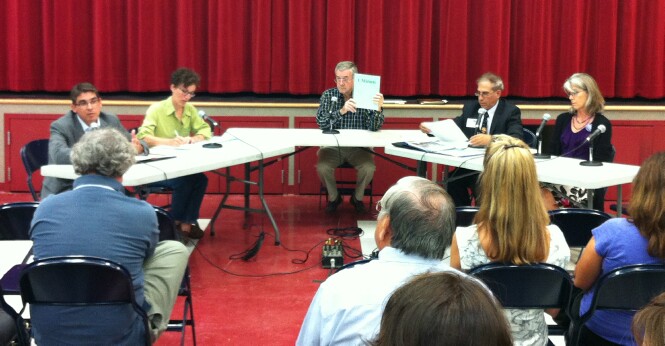

I wish Granda would be more specific. He keeps insinuating that the current board is wasting money, but he never gives as much as one example as to where he feels money could be saved (perhaps with the exception on cutting the salaries of administrators, but that is not going to keep the district afloat). It seems that he relies on some sort of magic to fix the economical challenges the district faces.
I thought he was a bit more specific last night. This piece didn’t get into it yet, but he basically said he didn’t buy the crisis, believes that the state tax measure can fund most of it, and that he wants some sort of non-profit to look for grants. That seems an awful lot like the Davis Schools Foundation to me.
Mr. Granda touts the wrong experience when he claims he is the only one in the classroom because a college classroom is a completely different world than most k through 10 classrooms. Maybe a 12th grade class or an AP class is similar to his experience.
As for experience Lovenburg wins again. Her service on the board has given her a realistic view of the current state of affairs in education that is unmatched by her competitors in this election.
By the way, I know that both Sherman and Peterson have also spent a lot of time in the classroom and at our schools as volunteers.
I took the time to attend the forum. Thank you, David, for organizing it.
I have an observation that I think is worth sharing.
The very first question of the evening, asked by Alan Fernandes, was about what major issues are pending in the California Legislature that will have an impact on school districts “exclusive of the ballot initiatives”. Even you did not state it correctly in your report here as Fernandes asked it. Sherman and Granda were either too nervous or preoccupied to listen to the question and, instead, focused on the initiatives. Nancy Peterson, the third candidate to respond, was the first to indicate she had listened to the question as it was initially posed by Fernandes. If being a good listener is a quality that is desirable for a school board members, Sherman and Granda disqualified themselves.
davehart, regarding your observation, one minor flaw to our format was that we didn’t think to print out five copies of the question to hand to the candidates when the question was/is being asked. That way the candidates could rely on their eyes as well as their ears in “hearing” the question when it is asked. Do you think that what you observed would have been changed if the candidates had had a written copy in front of them as they listened?
One other very general observation, David, is that your reporting seems very uneven in accurately conveying the positions of the candidates. Sometimes, particularly where you quote them, your reporting is on target. Other times, you completely missed things that were said that I thought were insightful. I would ask you to go back to the video and really listen to how the questions were asked and answered. On the other hand, maybe this is why people should attend these things in person and not rely on third party reporting.
For example, regarding Jose Granda’s question regarding what is “good teaching”, I found his comment when his turn to answer his own question came around to be very illuminating. He made a statement very close to “As a Board member, I would have to tell them how to teach if they don’t know how.” I found that to be both arrogant and to misunderstand the relationship of the Board to the staff. Susan Lovenburg was the only one who stated flat out that it is the Board’s job to set policy and that the policy the Board sets in place reflects the values of the community. Peterson, Fernandes and Sherman implied they believed the same thing. Granda, alone, clearly indicated he thinks it is proper to be directly involved in supervising teachers. Unless, of course, he “misspoke”.
Another example is Susan Lovenburg’s question regarding how to develop a good governance team on the school board. Fernandes’ answer was accurate, Sherman said “it okay to not get along” and “it’s okay to fight” citing her experience in the workplace. I understand the context but I wonder if she can distinguish between being on an elected board from a workplace group with different dynamics and power relationships. Personally, I don’t want to see our school board in the same situation as our past city council even though I understand her underlying point. Granda’s comments were accurately reported, but you left out his statement that “in the end you have to come together as a team”. That is astonishing in itself when you consider he is positioning himself as the anti-tax candidate. How does the school board come together as a team when you are out there in open rebellion against the official position of the same board? You captured Peterson and Lovenburg’s comments reasonably well.
Maybe what I’m saying is you should either wait and let the unedited video of this event speak for itself or take more time with each question.
Is there a video of the debate somewhere? I was unfortunately unable to attend, but I would love to see it.
The recording can be streamed at [b][u][url]http://dctv.davismedia.org/node/38532[/url][/u][/b]
Here is the written info about the forum from the DMA website
[i][b]Davis Vanguard, DMA to host election forum[/b]
Posted Thu, 09/20/2012 – 4:47pm by autumn
As the non-profit community media center serving Davis and Yolo County, Davis Media Access (DMA) has produced local election coverage since the mid 1980s, and considers voter education and community coverage core to our mission of creating community through media. This election season, The Davis Vanguard & Davis Media Access (DMA) will co-host a school board candidate forum, to be held in the Harper Junior High Multipurpose room on Monday, Oct. 1, 2012.
Both DMA and the Vanguard are non-profits and neither endorses candidates, but see the upcoming election as important to the community and hope to provide more information to community members as the election draws near. “Getting information out about campaigns and ballot issues shouldn’t be fraught with barriers. Air time is expensive and barring sensation, local politics are largely ignored by commercial broadcast media. DMA takes seriously our role in providing access to candidates, information for voters, and in documenting our community’s history around local campaigns,” said Autumn Labbe-Renault, executive director for DMA.
The doors open at 6:30 p.m. and the forum begins at 7 p.m.. The forum will have a unique set-up in that candidates will be seated facing each other in a discussion format. Each of the five candidates will ask one question, to be answered by themselves and the other candidates, to be followed by Q & A.
“Not only do we have five candidates with a broad range of ideas on how to improve our education system in the wake of consistent and persistent budget crises, but we also have a parcel tax measure on the ballot which means the voters will decide how much in the way of resources the members get to work with,” said David Greenwald, executive director of The Davis Vanguard.
The forum and other election programming will air on DCTV Channel 15 on Comcast; on AT&T’s U-verse service at Menu 99; on KDRT 95.7 FM (candidate statements only), and hosts the videos on demand at http://dctv.davismedia.org. For more information, please email info@davismedia.org or call us at (530) 757-2419.[/i]
Granda appears to be a school board candidate mainly for the purpose of opposing Measure E. I don’t see that he has carefully thought through or considered what roles the school board plays beyond proposing a school parcel tax.
Granda will be a breath of fresh air for the school board. They need a shake up and some new ideas.
David and Matt
The video works on iPad!
PLEASE tell the City how you and Davis Media accomplished this so the community can begin to get video of CC mtgs on Apple devices!
Matt, in response to your question above I think it was great that the questions were asked by the candidates and that the others had to respond “in real time”. In my first comment, I simply observed that the skill of listening was demonstrated better by two of the four candidates. Listening is a skill. If the public believes that they should be heard and listened to at public board meetings as well as in one-on-one conversations, the candidates should be capable of demonstrating that they can do it. I know it’s a little tough on the candidates but that’s the territory you walk into in public office.
Thanks dave. Did you get my voicemail? I’d like to have a cup of coffee with you. Your comment about water a week ago was interesting to me in my role as a WAC member.
rusty: [i]Granda will be a breath of fresh air for the school board. They need a shake up and some new ideas.[/i]
Granda has too steep a learning curve to overcome to be effective a while. For instance, he seems unaware of the point that Siegel made above at 10:15 AM.
davehart wrote: “The very first question of the evening, asked by Alan Fernandes, was about what major issues are pending in the California Legislature that will have an impact on school districts “exclusive of the ballot initiatives”. Even you did not state it correctly in your report here as Fernandes asked it. Sherman and Granda were either too nervous or preoccupied to listen to the question and, instead, focused on the initiatives. Nancy Peterson, the third candidate to respond, was the first to indicate she had listened to the question as it was initially posed by Fernandes. If being a good listener is a quality that is desirable for a school board members, Sherman and Granda disqualified themselves.”
I listened to the videofeed and I think you are grossly misrepresenting what happened. After Fernandes asked the question, the moderator repeated it and expressly did not repeat the “exclusive of the ballot initiatives” part of the question. So it seems unfair to say that they weren’t good listeners; after all, the moderator got it wrong too. Furthermore, if you listen to the entire video, you’ll see that every candidate asked the moderator to repeat questions, which tends to negate the point that only two individuals were “too nervous or preoccupied to listen.”
Based on this you would “disqualify” two candidates? Seriously? According to followthemoney.org Alan Fernandez got over $36 million in consulting money from Philip Morris, whose survival depends on getting kids addicted to tobacco. He got almost $17 million from PG&E, which spent a fortune defeating a Davis measure a few years ago that would have allowed us to purchase lower cost energy from SMUD. Maybe it’s just me, but I’m inclined to think this has somewhat more gravitas than needing a question repeated, if you want to talk about disqualifying a candidate.
Shane, the moderator read the written submitted question. Alan in saying his question added the additional qualifying words. That points out a lesson that we learned from this initial excursion with this format. The disconnect you point out would not have happened if we had handed each candidate a printed copy of each question just prior to it was asked.
With that said, as I sat and listened to all the five candidate questions and the 25 answers, there were several questions that were not [u]directly[/u] answered by one or more candidate. I don’t think anyone was noticeably less good or more good at listening to the questions. I personally came away from the evening with positive thoughts about each of the candidates.
“Alan Fernandez got over $36 million in consulting money from Philip Morris, whose survival depends on getting kids addicted to tobacco. He got almost $17 million from PG&E, which spent a fortune defeating a Davis measure a few years ago that would have allowed us to purchase lower cost energy from SMUD.”
Seems like a lot of money. I went to the site but couldn’t find anything. Could you please provide a link?
@Mr.Toad: go to: http://www.followthemoney.org/database/lobbyist.phtml?l=72564&so1=o
The current board members are too similar in their opinions. Granda and Sherman would add the most diversity of opinion, Fernandez and Lovenburg would add the least. They all have valuable experience to contribute to the district, and if there is any truth to Shane’s allegation… Fernandez should be the district fund raiser (NOT A BOARD MEMBER). Lovenburg needs to explain her parochial view that funding for Davis schools is more important than a more equitable State policy for allocating education funds. If she is going to place self interest above public interest then she is not qualified for any public office.
This is what I found at the link: “No contributors were found matching FERNANDES, ALAN N.”
Then there is a client list but no specific amounts tied to Mr. Fernandez. i think if you are going to tar someone for having a day job you should get your ducks in a row. His current job is as a lobbyist for L.A. hardly the money grubber you ascribe him to be.
@Mr.Toad: check your link again. Below the line that says No contributors were found matching FERNANDES, ALAN N. you will see a list of “Represented Clients.” These include specific amounts related to Philip Morris ($36,291,366), PG&E ($16,690,053), Altria ($1,167,300), etc. People can have any day job they want, but that doesn’t obviate the concern of a conflict of interest if issues related to tobacco control, energy savings, etc. come before the school board.
This is a school board election – why does any of this matter?
Its a lot of money where do you think he keeps it?
Mr Toad wrote:
> Its a lot of money where do you think he keeps it?
A lobbyist does not “keep” much money they use most of it to “bribe” politicians (and get away with it because most of the “bribes” are perfectly legal campaign or super PAC contributions)…
Yes, so Fernandez didn’t get all that money. My guess is he didn’t even get 1% of it.
I don’t think the issue is if he kept the money. The point is when you are dealing with kids, is this the level of morality and ethics that we choose to “make things happen”
By themselves character and integrity don’t accomplish anything but their absence faults everything else.
First, thank you for your interest in my candidacy and in particular my professional background. I am writing to provide the facts about my background because some of the recent comments are inaccurate. So, here are the facts. I have NEVER represented tobacco interests of any kind on any matter. While it is true that I once worked at a large law firm with many diverse clients (like many of our other locally elected officials), I, personally [b][u]only[/u][/b] represented local government entities (including cities, counties, and school districts) and non-profits interacting with government. Indeed, it is precisely this experience which I believe makes me a highly qualified school board candidate and one who will be able to recognize solutions to our existing challenges.
Recently, I was endorsed by Supervisor John Gioia who is the Chair of the Cities Counties Schools Coalition, a statewide organization of all local governmental entities working together in search of solutions to our fiscal challenges and reforming public service for the future. He supports me because I worked closely with him and he knows me to be honest, ethical and hard working on behalf of the public good. I am proud of my professional background and believe my knowlege and experience would be of great benefit to our school district and all our students here in Davis. Again, thank you for your collective interest and for the opportunity to provide the facts about my background.